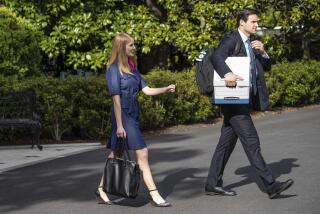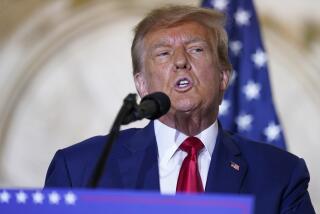Ex-Clinton Aide Faults Travel Office Case
- Share via
WASHINGTON — A former presidential aide acknowledged to Congress Tuesday that the White House made serious mistakes in its dismissal of seven travel office employees two years ago and later tried to take “corrective” action by offering most of them other government jobs.
The acknowledgment by John Podesta, former White House staff secretary, and testimony of others on Tuesday reignited debate over the May, 1993, firings. It also led to charges that Republicans were using the hearing simply to embarrass President Clinton over an early Administration fiasco, in which the employees were abruptly dismissed after complaints of mismanagement and possible wrongdoing by friends of Clinton.
Rep. William F. Clinger Jr. (R-Pa.), chairman of the House Government Reform and Oversight Committee, charged that Podesta’s internal investigation should have highlighted conflicts of interest by presidential associates.
Clinger said “rumors and allegations that led to the firings” were inspired by Hollywood producer Harry Thomason, a close friend of Clinton, and by Catherine Cornelius, a distant cousin of Clinton’s who handled some presidential campaign travel.
While Thomason was complaining to White House officials that travel office employees were failing to seek competitive bids in arranging charter flights for the press corps, Thomason himself was seeking a non-competitive government aviation contract for his business partner, according to Clinger.
Clinger said it was “blatant” that Thomason spoke to the President about obtaining that contract from the General Services Administration. The contract to review all non-military government aircraft was shelved in the aftermath of the travel office controversy, he said.
*
Podesta, now a professor at Georgetown University Law Center, denied that Thomason had any personal financial motives in pushing for a shake-up in the travel office. Washington attorney Robert S. Bennett, who represents Thomason, added that Clinger’s charge was “a lie and an outrage.”
The committee disclosed a memo indicating that Thomason presented the President with a $270,000 proposal in February, 1993, to review federal civilian aircraft. The work would have been done by a company called TRM, in which Thomason and businessman Darnell Martens held an interest. Clinton appended a note to the memo telling his aides: “These guys are sharp.”
Podesta, while defending Thomason’s conduct, said his review found “that the White House was insensitive to the appearance of favoritism.”
Democrats on the committee accused Clinger of using the hearing for partisan purposes, particularly when he refused to permit them to ask questions about alleged irregularities in the White House travel offices under former GOP Presidents Ronald Reagan and George Bush. Clinger said that such questions went “beyond the scope of the investigation” and that the panel’s witnesses “were not conversant” with those matters.
Rep. Henry A. Waxman (D-Los Angeles) told Clinger: “The scope of the investigation is deliberately being designed to embarrass the President.”
Another committee witness, Michael E. Shaheen Jr., chief of the Justice Department’s office of professional responsibility, testified that his own investigation into the May, 1993, firings concluded that Clinton’s aides had taken “ill-advised and erroneous actions.”
In December, 1994, the FBI’s scrutiny of travel office records led to charges of embezzlement against office manager Billy R. Dale, one of those fired. Dale is scheduled to go to trial Thursday in federal court here.
More to Read
Sign up for Essential California
The most important California stories and recommendations in your inbox every morning.
You may occasionally receive promotional content from the Los Angeles Times.













